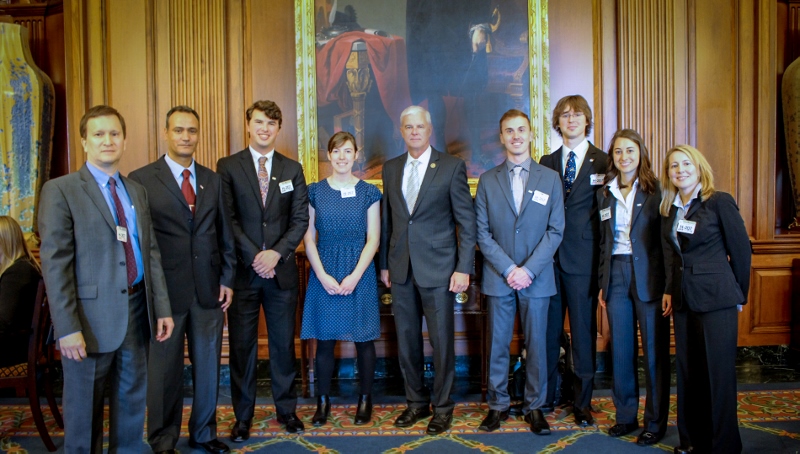
Students from the University of Arkansas recently competed with 38 other universities in the Environmental Protection Agency's People, Prosperity and the Planet, or P3, Competition during the National Sustainable Design Expo in Washington, D.C. Chemical engineering students Kimberly Cribbs,* Brandon Hart, Bryce Jones* and Michael Reinisch,* and biology major Allysa Swearingen* received two awards for their project, a device that detects waterborne pathogens.
The team's mentors are Ahmed Elmasheiti, a doctoral student in the interdisciplinary cell and molecular biology program; Bob Beitle, professor of chemical engineering and associate vice provost for research and economic development, and Christa Hestekin, associate professor and holder of the Ansel and Virginia Condray Endowed Professorship in Chemical Engineering. Elmasheiti, Beitle and Hestekin received a grant from the Environmental Protection Agency to develop the device. The student team then produced a prototype, which they demonstrated at the National Sustainable Design Expo. The researchers and students are collaborating with NowDiagnostics, a medical equipment company based in Springdale.
"Our device is a biosensor that detects waterborne pathogens in less than 45 minutes," explained team member Bryce Jones. Our unique contribution is the device design, because our unit costs less than five dollars, which is orders of magnitudes less than other devices. It detects the pathogens by amplifying their DNA through a process called LMAP PCR, which makes many copies of the DNA. We added a fluorescent dye that binds to DNA to make the water sample glow, indicating the presence of the pathogens. The actual device was built to house this reaction and keep it at 62 degrees Celsius for 45 minutes."
The students' design won two honorable mention awards from the EPA, which awards a first place and honorable mention in five areas. One award was from Engineers without Borders, who are willing to test the device in the field. While they were in D.C., the students also had the opportunity to meet with Congressman Steve Womack at the Capitol, and received a private tour from Senator John Boozman's office.
Jones explained that the Design Expo was inspiring, "because so many companies, universities, and government agencies came together to encourage students to pursue the sciences and make a difference in the world. This competition is a great way for students interested in helping the environment and developing nations to get involved and truly make a difference."
The team is now eligible to compete for Phase 2 of the P3 competition, a $75,000 grant to further develop and produce their product. The researchers and NowDiagnostics are also applying for small business grants through the Small Business Innovation Research program and the Small Business Technology Transfer program. "We are in a position to go after larger opportunities, like adapting the device to detect Zika in urine," said Beitle.
*Honors College students
Contacts
Camilla Shumaker, director of communications
College of Engineering
479-575-5697,